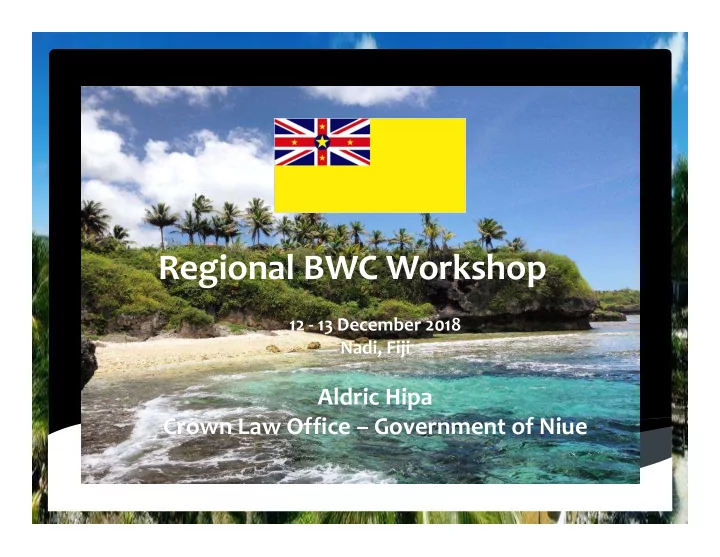

Regional BWC Workshop 12 - 13 December 2018 Nadi, Fiji Aldric Hipa Crown Law Office – Government of Niue
Introduction “The road to accession of the BWC: Niue’s experience” 1. BWC Regional Universalization Workshop, Nadi 2017 2. Rationale: Niue & Disarmament 3. Ratification Process 4. Challenges and lessons learnt
1. The Invitation to the BWC BWC Universalization Workshop, Nadi, July 2017 Introduced to the BWC, relevant agencies, regional State Parties Informed of what there is to know about the BWC 5 Pacific States yet to ratify the BWC: Federated States of Micronesia, Kiribati, Niue, Samoa & Tuvalu Guest Speaker, BWC State Party - Nauru
BWC Universalization Workshop, Nadi, July 2017 contd. Following 2017 workshop, began internal ratification process Samoa acceded September 2017 Niue acceded June 2018
2. Rationale - Niue & Disarmament Why did Niue accede to the BWC? - Peace & Security as fundamental: national, regional, international - Align with NNSP & SDG16 ‘Peace & Security’ - International pressure ‘the blacklist’ - Ministerial direction - Support for disarmament movement
Works in Progress Niue Government actively considering ‘Arms Trade Treaty’ - drive towards & against ‘weapons’ Work on fundamental ‘pillars’ of work against weapons of mass destruction - Chemical Weapons Convention Act 2007 - Nuclear Test Ban Act 2014 Convention on Cluster Munitions Anti-personnel Mines Convention ‘Anti-personnel Mines and Cluster Munitions Bill’ TPNW – Treaty on the Prohibition of Nuclear Weapons BWC aligned with Government objectives on disarmament
3. Ratification Process Domestication of implementing legislation is a requirement prior to ratification/accession of Treaties/Conventions 1.Consideration of Treaty – by invitation or Political will 2. Ratification Proposal 3. Circulation for Government Ministries comments 4. Compilation of Cabinet Proposal 5. Draft of Implementing Legislation (usually model law) 6. Cabinet Submission twofold: i) To ratify the Convention ii) To pass legislation to implement Convention 7. Should Cabinet approve – prepare documentation for tabling draft legislation in Legislative Assembly, and ratification documentation 8. Subject to Legislative Assembly, enact legislation and deposit Instrument of Ratification
Ratification Proposals
Biological Weapons Convention Bill 2018 Domestic procedures - legislation requisite of Ratification of Treaties BWC Bill based on model legislation, amended to Niue context “An Act to implement into the law of Niue, the Convention on the Prohibition of the Development, Production, and Stockpiling of Bacteriological (Biological) and Toxin Weapons and on their Destruction”.
Biological Weapons Convention Bill 2018 Cabinet authorized accession to the BWC in March 2018 Bill tabled in Parliament, 1 st reading March 2018 Referred Bills Committee Amendments made 2 nd reading in May 2018
Parliamentary Bills Committee – Internal Select Committee Sitting in Parliamentary Bills Committee Meetings Clause by clause analysis Convincing Parliamentarians – deliver in an understanding way MP’s ask why? Security incl. national, food, economic Example: Ebola virus, agricultural ‘pest’ as a weapon BWC as weapons of mass destruction WMD have no borders, no one is safe! FULL SUPPORT by Legislative Assembly
Biological Weapons Convention Bill 2018 2 nd and 3 rd reading in Parliament Enacted into Niue law, Parliament May 2018 Constitutional requirement: translated into Vagahau Niue
Ratification Documentation Signed in May 2018 Sent to depository in Washington DC, USA Accession to the BWC as of 14 th June 2018
4. Challenges and lessons learnt 1. Convincing Assembly Members 2. Translation into Vagahau Niue – difficulty in terminology “Ko e Fakatufono Tohi mae fakavēaga he tau Kanavaakau (pomu) moko kona 2018”
4. Challenges and lessons learnt 1. Difficulties with the Depository - Washington DC i. Questioned ‘Niue’s competence to join the BWC in its own right’ ii. Niue’s status as a sovereign self-governing State in free association with New Zealand iii. New Zealand Declaration to the UN in 1988, that Niue (and the Cook Islands) will no longer be subject to international agreements as a result of New Zealand treaty action. iv. Representatives of the US State Department – offered assistance yet not forthcoming.
4. Challenges and lessons learnt 2. Difficulties in communication i. Instrument of Accession: sent May 2018, received June 2018, received notification late July 2018. ii. Lack of official communication to Niue Government, for Niue’s accession and New Zealand’s declaration iii. Notification via social media iv. Learnt: New Zealand’s 1972 BWC ratification applicable to Niue
Promote Universalisation Encourage accession by remaining non-State Parties in the Pacific Region Encourage active participation of States in the Region already Party to the BWC
Acknowledgements Government of Fiji Government of Australia BWC ISU SPECIAL THANKS Peter Barcroft & Parliamentarians for Global Action (PGA) Hon. Associate Minister Taefu, Samoa
Questions Email: aldric.hipa@mail.gov.nu
Fakaue Lahi – Thank You
Recommend
More recommend